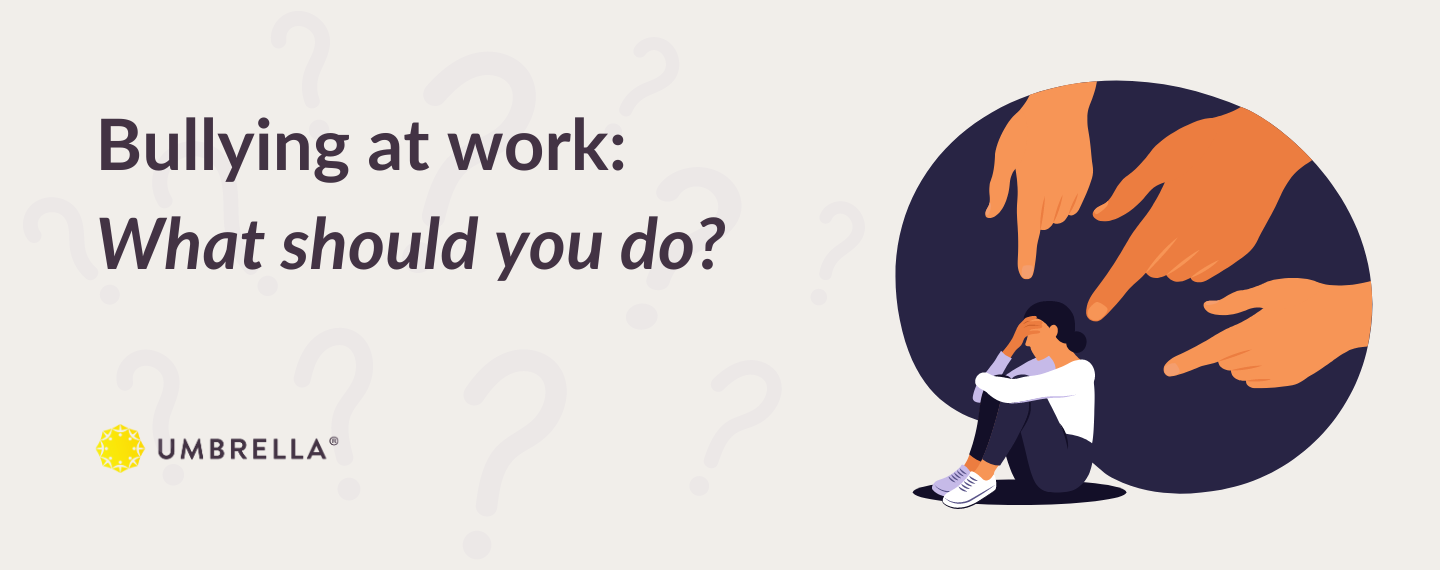We’ve recently written about the impacts of bullying at work. It can be so tricky to respond to bullying, including when it is happening to you and when you witness it happening to others. In these situations, we want to address the problem, but understandably worry about potentially making it worse.
Here is some advice from our Umbrella psychologists on what to do if you see or experience bullying:
If it’s you being bullied:
- Seek support. Tell someone you trust about what is happening and how it feels to you. It’s common for those experiencing bullying to question themselves, wondering if it’s really that bad. Sharing what’s going on with someone else can help you to make sense of it.
- Recognise your own feelings. Experiencing bullying as an adult is no less difficult than it is for children. It’s normal to feel confused, hurt, upset, frustrated, angry, embarrassed, or ashamed. At work, we may also be worried about our professional reputation.
- Keep track. It can be helpful to note down the behaviour you consider to be problematic, including what was said and done as specifically as you can, as well as when it happened and anyone who may have witnessed it. This type of log can help to develop a clearer picture of what is happening, and will also be valuable should you wish to make a complaint against the bully.
- Think about what next. You likely have a range of options available to you. There’s no right or wrong answer here, what’s right for you might be different than for someone else in this situation.
- If you want to confront the person. This action is most useful when the behaviour is relatively new. Try to be specific about the action they have taken and what you’d like to see done differently. Think about what you’ll say ahead of time, and how the person might respond. It’s understandable that you would feel anxious or intimidated in the moment and therefore less able to think clearly. Try not to rush to assumptions about the person’s motives. You might try something like, “I heard that you had said X about me, which isn’t true. I’d really like it if you didn’t say things like that.” It’s much harder for them to dodge or deny what has occurred if you are specific.
- Raise your concerns. In a workplace context, take your concerns to someone senior that you trust to listen to you, such as a manager or HR team member. Try to be as descriptive and specific as you can about the behaviour that is happening. Employers are much more able to address the situation with specifics rather than general terms such as bullying, excluding, treating badly or differently. If you are considering a formal complaint, find out what policies are in place in your workplace.
- Seek external support. This could be from friends and family, or you could access your Employee Assistance Programme.
- For more detailed advice, see Employment New Zealand’s guidance on bullying, harassment and discrimination.
If you witness someone being bullied:
- Check in with the person. Make sure what you think you heard or saw is accurate, raise your concerns with the actions you witnessed, and ask what the person who it was directed at thinks about the situation. You could also check with anyone else who witnessed the behaviour. Doing nothing enables these types of actions to continue or get worse.
- Make it clear that you do not agree. If you feel able to, directly call out the bully’s behaviour with comments like, “I don’t think what you’re saying about her is true” or “I think it’s pretty unfair for him when you keep undermining his work.”
- Offer to be a friend. Approach the person you feel is being bullied, and suggest having lunch or going for a coffee together. Listen to them. Encourage the person to take action that they feel is right for them, helping them to feel empowered. You could offer to be a support person if the person wants that.
- Demonstrate support. For example, if someone is being deliberately excluded, you could try including or inviting them. If the person is constantly being shut down from getting their point across, you could make a point of saying, “Hey, Aroha just started to say something, can we go back so I can hear what she was trying to say?”
- Don’t dismiss the target’s feelings. Research interviews with targets of bullying found that often they were told to calm down or not take the behaviour personally. This advice led them to feel like their emotions were being dismissed. We know from extensive psychological research that having one’s emotions invalidated or dismissed actually makes emotional responses more difficult to regulate. So, if someone comes to you about bullying, listen and ask how it is affecting them. Show that you can understand their feelings by reflecting back the emotions you hear them saying, e.g. “It sounds like you’re feeling really hurt by her behaviour”.
It’s a really difficult experience to feel stuck in the middle of workplace bullying. Using the above ideas, we can help to support one another and take action to address the bullying behaviour.



